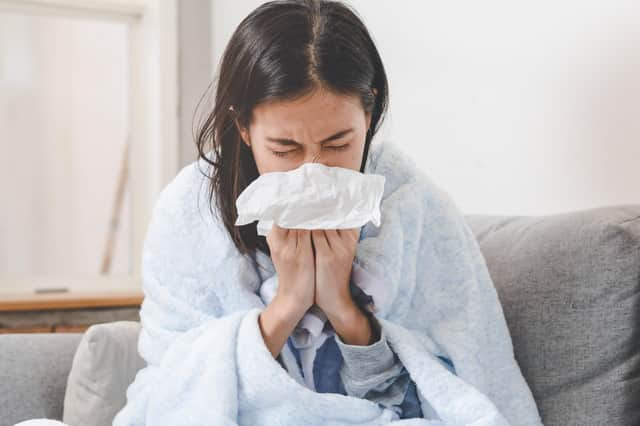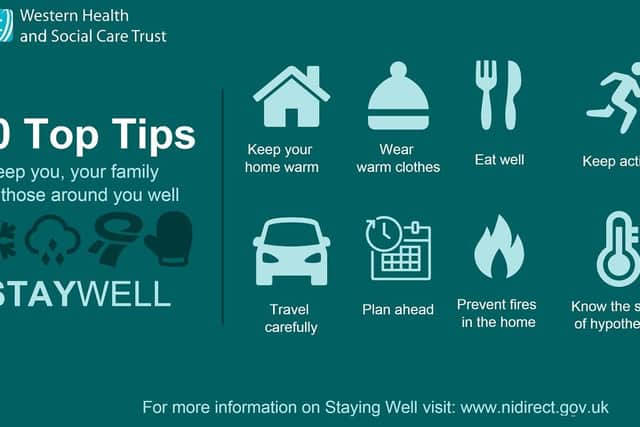Derry people advised to stay warm, well and boost immunity this winter


Winter is traditionally a busy period for the Western Trust and our health and social care system has faced a very difficult and challenging two to three year period due to the COVID-19 pandemic. This year we have a particular concern about flu as restrictions meant there has been much less flu circulating in our communities and therefore immunity in the population is low.
As we have come out of the pandemic with society returning to normality we are seeing an increase in a range of winter ailments including coughs and colds, Influeneza (flu), Covid-19 and Norovirus (winter vomiting disease) all of which are spread easily in our communities.
Advertisement
Hide AdAdvertisement
Hide AdYoung children are particularly susceptible to viruses as their immune system hasn’t been fully developed so it is important that parents and carers are aware of signs and symptoms of possible infections such as Scarlet fever which is currently circulating. If your child is feeling unwell and you have any concerns please speak to your GP, health visitor or community pharmacist for help and advice.


People with chronic long term health problems can see these exacerbated, for example those with breathing problems like asthma and Chronic Obstructive Pulmonary Disease (COPD – a disease of the lungs) find the cold damp weather makes breathing harder. In addition icy and snowy conditions inevitably lead to slips and falls, especially amongst the elderly who are more likely to be seriously injured and immobilised by breaks and sprains.
Seamus Ward, Western Trust Head of Health Improvement commented: “The Trust is committed to promoting the health and well-being of staff, clients, patients and all members of the community. It is vitally important that we make people more aware of the effects of cold weather and provide advice on staying healthy. We are particularly aware of the challenges of people keeping their homes warm due to the cost of living crisis and are working with partner agencies to ensure we get the message out to the local communities on what support and advice are available to help them through the winter months.”
Encouraging the public to take up the opportunity to get their flu and COVID-19 Booster Vaccinations Seamus said: “There are things we can all do to ensure our community keeps well and I would encourage our staff and the wider public to boost their immune system and protect themselves from serious illness this winter by booking their vaccination as soon as possible.”
Advertisement
Hide AdAdvertisement
Hide AdSeamus added: “The Western Trust is urging you to follow and promote 10 tips to keep you, your family and those around you well.
- Keep your home warm - Draw your curtains at dusk and keep your doors closed to block out draughts. Your main living room should be between 18-21C (64-70F) and the rest of the house at a minimum of 16C (61F) Use a hot water bottle or electric blanket (but not both at the same time) to keep warm while you’re in bed.
- Wear warm clothes - Wrap up warm, inside and out. Wear several thin layers of clothes in order to keep the warm air trapped between them. Wear hats, gloves and scarves and wear shoes with a good grip if you need to go outside. If you get wet, change into dry clothing as soon as you get indoors.
- Eat well - Food is a vital source of energy, which helps keep your body warm. Try to eat regular hot meals to keep your energy levels up and drink hot drinks to help you to feel warmer for longer.
- Keep active - Move around at least once an hour and don’t sit down for long periods of time. Even light exercise will help keep you warm in your home.
- Help others - Check on friends, relatives and neighbours who may be more vulnerable in cold weather. Make sure they're warm enough, especially at night, and have stocks of food and medicines.
- Travel carefully - Icy pavements and roads can be extremely slippery. Take extra care if you go out, and wear boots or shoes with good grip on the soles. Bear in mind that black ice on pavements or roads might not be clearly visible, and compacted snow may turn to ice and become slippery.
- Plan ahead – check the weather forecast before traveling so that you are prepared for journeys and keep a list of people at hand that you can contact if you are unable to get out of your home .
- Prevent fires in the home - Unplug heaters/blankets when not in use. Don’t leave candles unattended. Do not use portable heaters for drying clothes. Make sure you have a fitted and working smoke alarm and carbon monoxide monitor.
- Recognise the signs of hypothermia - Hypothermia is caused by being in a cold environment. People who are particularly at risk are those who are elderly, ill or babies. If someone you know has been exposed to the cold and they are distressed, confused, have slow, shallow breathing or they're unconscious, they may have severe hypothermia. In this case, dial 999 immediately to request an ambulance. While waiting for medical help, it is important to try to prevent further heat loss and gently warm the person.
- Consider you alcohol intake – Staying within the lower risk guidelines will go a long way to avoiding cold-related dangers such as hypothermia and falling. Knowing how you’re getting home, sticking with friends and wearing warm clothes will also help to ensure you have a safe night out.
For more information on Staying Warm this winter, including Cost of Living information and advice please go to: https://www.nidirect.gov.uk